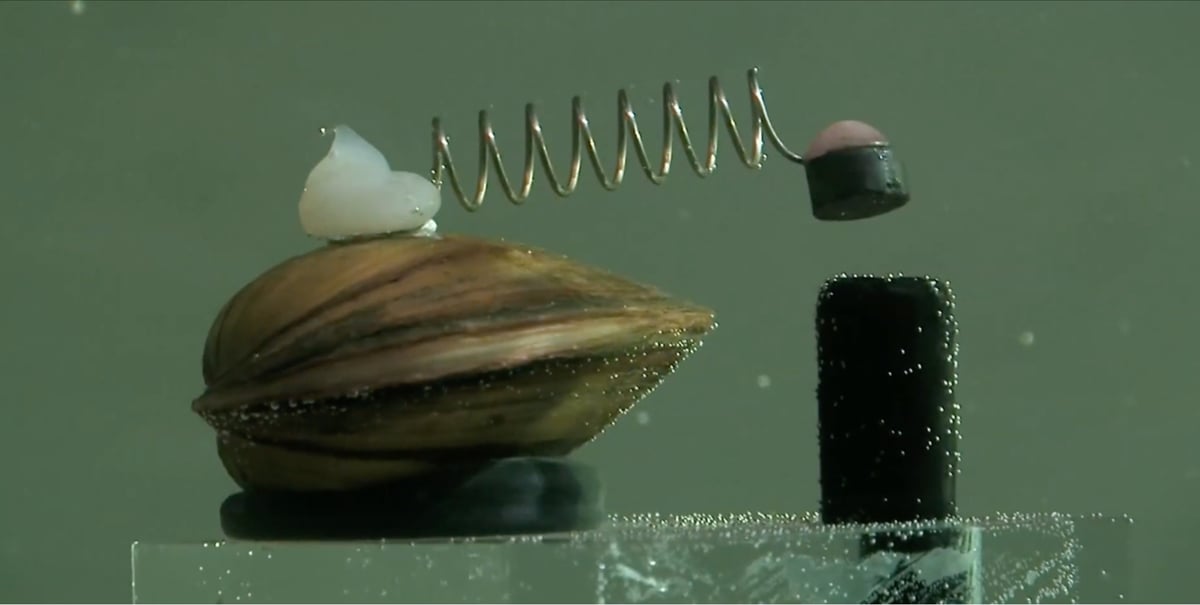Eight Clams Control This Polish City’s Water Supply

In the city of Poznań, Poland, a group of eight clams controls the local water supply through a clever bio-monitoring system:
These biological systems are comprised of eight mussels with sensors hot-glued to their shells. They work together with a network of computers and have been given control over the city’s water supply. If the waters are clean, these mussels stay open and happy. But when water quality drops too low, they close off and shut the water supply of millions of people with them.
According to The Economist (archive), more than 50 such systems are now deployed in Poland and Russia to help protect water supplies:
The system is nifty. When the molluscs encounter heavy metals, pesticides or other pollutants, they close their shells, explains Piotr Domek of Adam Mickiewicz University in Poznan, who has worked on the project for three decades. To create a natural early-warning system, Mr Domek and his colleagues collect the clams from rivers or reservoirs, and attach a coil and a magnet to their shells. Computers register whether their shells are open or closed by detecting changes in the magnetic field.
“In the case of a terrorist attack, an ecological disaster or another contamination of the water supply, the clams will close,” says Mr Domek. This, in turn, will automatically cut off the water supply. The clams, he thinks, are life-savers. “If contaminated water goes straight to our taps, we will get poisoned,” he says in “Fat Kathy”, a short film that celebrates the invaluable bivalves.
You can watch that short film here:
Each clam serves a tour of duty of a few months:
Each worker mussel spends three months on duty — after that, they become too accustomed to their new surroundings and are no longer sensitive enough to properly monitor the water. For retirement, they are gently tossed back where they came from.





Comments 1
What a simple and effective concept. Immediately reminded me of “Ways of Being”, which I think must have been recommended to me here.
Hello! In order to comment or fave, you need to be a current kottke.org member. If you'd like to sign up for a membership to support the site and join the conversation, you can explore your options here.
Existing members can sign in here. If you're a former member, you can renew your membership.
Note: If you are a member and tried to log in, it didn't work, and now you're stuck in a neverending login loop of death, try disabling any ad blockers or extensions that you have installed on your browser...sometimes they can interfere with the Memberful links. Still having trouble? Email me!
In order to comment or fave, you need to be a current kottke.org member. Check out your options for renewal.
This is the name that'll be displayed next to comments you make on kottke.org; your email will not be displayed publicly. I'd encourage you to use your real name (or at least your first name and last initial) but you can also pick something that you go by when you participate in communities online. Choose something durable and reasonably unique (not "Me" or "anon"). Please don't change this often. No impersonation.
Note: I'm letting folks change their display names because the membership service that kottke.org uses collects full names and I thought some people might not want their names displayed publicly here. If it gets abused, I might disable this feature.
If you feel like this comment goes against the grain of the community guidelines or is otherwise inappropriate, please let me know and I will take a look at it.
Hello! In order to leave a comment, you need to be a current kottke.org member. If you'd like to sign up for a membership to support the site and join the conversation, you can explore your options here.
Existing members can sign in here. If you're a former member, you can renew your membership.
Note: If you are a member and tried to log in, it didn't work, and now you're stuck in a neverending login loop of death, try disabling any ad blockers or extensions that you have installed on your browser...sometimes they can interfere with the Memberful links. Still having trouble? Email me!